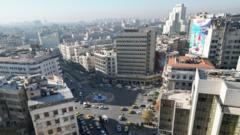Idlib City has experienced a mix of strict law enforcement and community responsiveness since falling under the control of Islamist group Hayat Tahrir al-Sham, as cafes adapt to these regulations while navigating public expectations.
Life Under Islamists in Idlib: Balancing Law and Public Needs

Life Under Islamists in Idlib: Balancing Law and Public Needs
Amidst strict regulations, some residents in Idlib express improved living conditions under rebel governance.
In the bustling city of Idlib, the local café landscape tells a complex story of life under Islamist rule. The Shababeek café, prominently located near the clock tower square, reveals a blend of cultural shifts shaped by the governing authority, Hayat Tahrir al-Sham (HTS). The café owner, Yahia Naeme, notes the absence of traditional music and hookah smoking as a result of a ban enforced by HTS—decisions impacting his business yet reflecting the broader context of governance in the region.
Naeme acknowledges that the enforcement of these strict laws has driven some patrons away. Before the ban, many customers frequented his café primarily for smoking hookah and enjoying music. Although some other café owners have found ways to bypass restrictions, Naeme prefers to comply with HTS regulations to avoid conflicts with the ruling power.
While the heavy-handed laws are evident in public life, residents of Idlib have also expressed satisfaction with certain improvements in public services. Reports indicate that HTS has prioritized infrastructure, ensuring that essential services like water supply are consistent, thereby gaining a measure of legitimacy among the populace.
The juxtaposition of strict enforcement and recipients' needs raises questions about governance under non-state actors in conflict zones. As HTS demonstrates its capabilities, the dynamics of power, community satisfaction, and the impact of imposed laws are shaping daily life in Idlib.
As Idlib continues to navigate the complexities of governance under rebel rule, the experiences of residents highlight both compliance to regulations and the contrast between restrictions and practical improvements in living conditions. It exemplifies how authority manifesting in unconventional forms can lead to varying degrees of acceptance among the governed.
Naeme acknowledges that the enforcement of these strict laws has driven some patrons away. Before the ban, many customers frequented his café primarily for smoking hookah and enjoying music. Although some other café owners have found ways to bypass restrictions, Naeme prefers to comply with HTS regulations to avoid conflicts with the ruling power.
While the heavy-handed laws are evident in public life, residents of Idlib have also expressed satisfaction with certain improvements in public services. Reports indicate that HTS has prioritized infrastructure, ensuring that essential services like water supply are consistent, thereby gaining a measure of legitimacy among the populace.
The juxtaposition of strict enforcement and recipients' needs raises questions about governance under non-state actors in conflict zones. As HTS demonstrates its capabilities, the dynamics of power, community satisfaction, and the impact of imposed laws are shaping daily life in Idlib.
As Idlib continues to navigate the complexities of governance under rebel rule, the experiences of residents highlight both compliance to regulations and the contrast between restrictions and practical improvements in living conditions. It exemplifies how authority manifesting in unconventional forms can lead to varying degrees of acceptance among the governed.





















